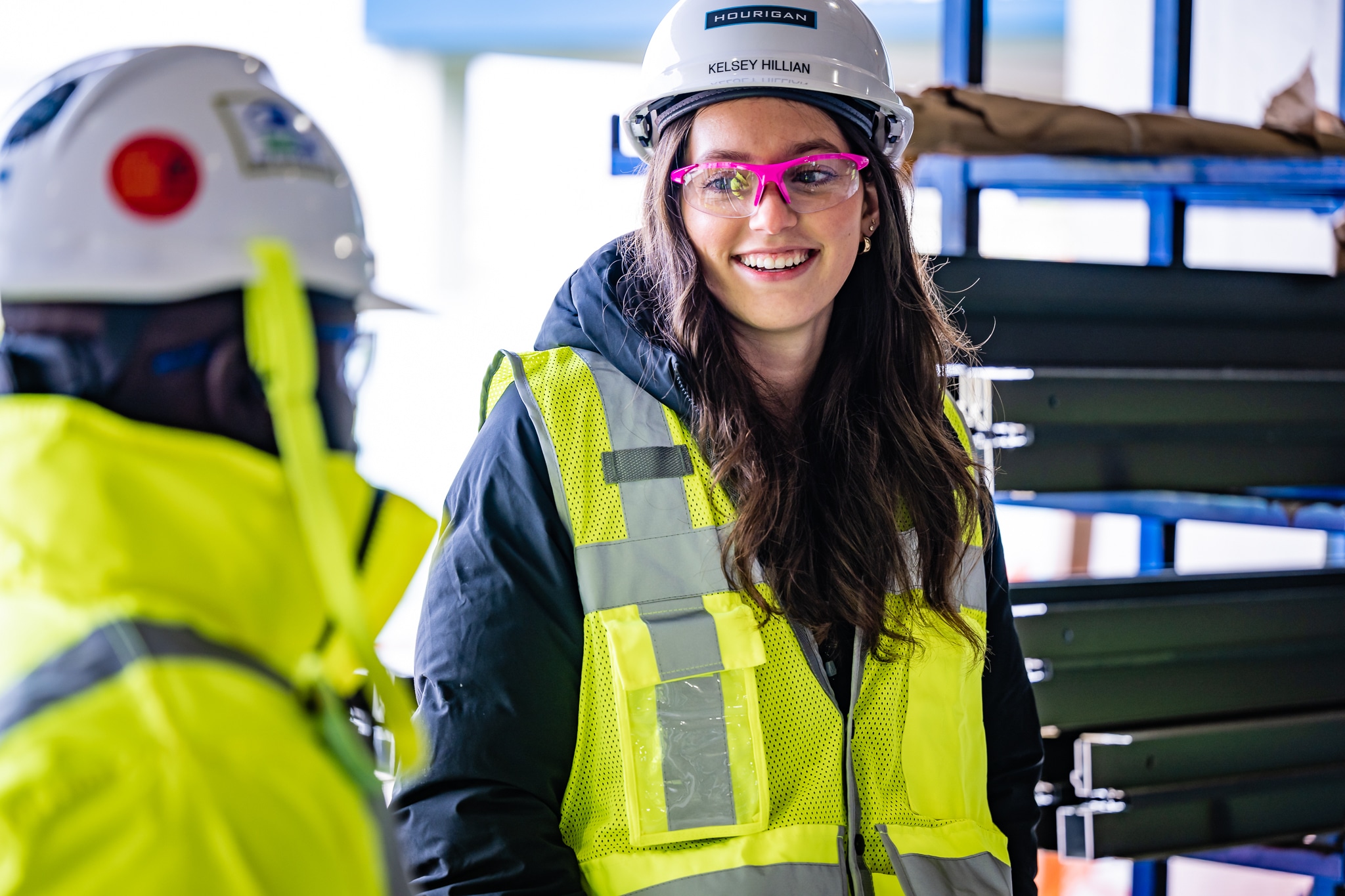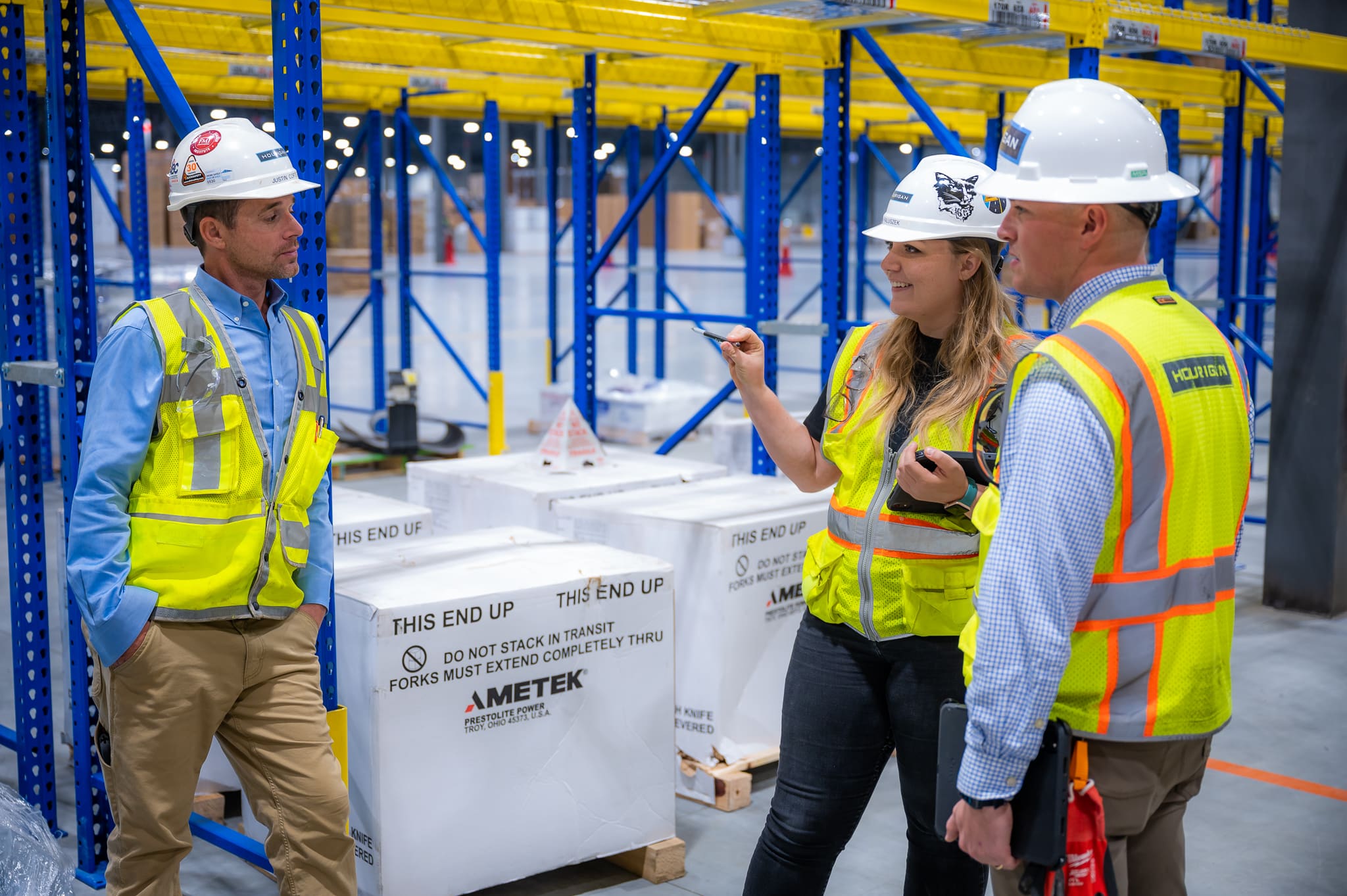As we celebrate Women in Construction Week, it’s crucial to recognize the strides made in diversifying the construction industry and the pivotal role that Diversity, Equity, and Inclusion (DEI) programs play in this journey. Fundamentally, DEI programs help to foster an inclusive workplace culture, attract diverse talent, enhance innovation, and improve decision-making through the exchange of varied perspectives and experiences. At the forefront of this effort at Hourigan, is our company’s DEI program, BEAM (Bolstering Equity, Access, and Mobility), which embodies the principles of workforce development, supplier diversity, hiring and advancement, and inclusive culture. Such programs have a significant impact in crafting career paths and empowering women in construction.
Building the workforce of tomorrow is accomplished by working to increase the capacity of trade partners and expanding the talent pool through community engagement. These efforts strategically prime the construction industry for diverse growth. Tactically, companies can foster collaborative relationships with trade partners, facilitating knowledge-sharing and skill development. Engaging in comprehensive education initiatives ensures that trade partners have access to the latest technologies, best practices, and regulatory requirements, empowering them to deliver high-quality workmanship and innovative solutions. Additionally, targeted outreach efforts aim to attract new talent to the construction sector by promoting the diverse career opportunities available and providing pathways for entry and advancement. By investing in workforce development through engagement, education, and outreach, companies not only strengthen their partnerships but also contribute to the sustainability and resilience of the construction workforce for generations to come.

Promoting supplier diversity within is not just about meeting quotas; it’s about fostering inclusivity and empowering underrepresented businesses. Through proactive outreach, networking, and engagement efforts, companies can expand their supplier base and create opportunities for minority-owned, women-owned, and other diverse businesses to thrive. By setting clear goals, providing training, and promoting certification programs, companies ensure that supplier diversity becomes an integral part of their procurement processes, driving positive change within their supply chains.
These efforts contribute to a more inclusive business environment and yield tangible benefits such as access to innovative solutions, enhanced competitiveness, and strengthened community ties. By transparently tracking and reporting supplier diversity metrics and collaborating with diversity organizations, leaders can demonstrate their commitment to equity and social responsibility. Actively seeking out and supporting women-owned businesses as suppliers and contractors contributes to the economic empowerment of women within the construction ecosystem. This fosters a more inclusive supply chain and creates pathways for women entrepreneurs to succeed in traditionally male-dominated industries.
Recruiting, Hiring, and Advancement
Hiring and advancement practices within a DEI program are essential in leveling the playing field for all employees, particularly in advancing women within the construction industry. By implementing fair and gender-neutral recruitment practices and transparent career progression pathways, companies eliminate barriers that hinder women from excelling in construction roles. Starting with targeted outreach and partnerships with women’s organizations actively fosters gender diversity in recruitment efforts by seeking female candidates. Additionally, tailored internships, apprenticeships, and mentorship programs help to create pathways for women’s success and leadership development in the construction sector. Transparent career pathways and advancement opportunities provide equal access for women to grow and progress within their roles, by providing clear criteria for promotion based on merit.
Participation in decision-making processes and leadership roles further strengthens women’s leadership development, enhancing competitiveness in a diverse construction industry landscape. By investing in training, mentorship, and educational opportunities, employers not only enhance employee productivity and performance but also attract top talent, positioning the company as a desirable workplace within the industry. A top-down commitment to employee growth and advancement fosters increased job satisfaction, enhanced job security, and a positive, motivated workforce, ultimately benefiting both employers and employees in a mutually rewarding relationship.

Fostering a Culture of Inclusivity
Fostering an inclusive culture is built from creating an environment where women feel valued, respected, and supported. Companies who promote diversity in leadership, amplify women’s voices in decision-making processes, and foster a sense of belonging for all employees, regardless of gender, promote the retention of female talent.
The built environment can also help to foster this inclusive workplace for women. Providing dedicated wellness rooms equipped with the necessary amenities allows nursing mothers to comfortably and privately express breast milk. Gender-neutral bathrooms also promote inclusivity for all employees, regardless of gender identity, ensuring a safe and welcoming environment. On the construction site, designated female-only restrooms ensure privacy and dignity for women in traditionally male-dominated environments.
Paid maternity leave allows new mothers to take time off to care for their newborns without financial strain, promoting work-life balance and higher rates of return to work. Flexible work arrangements accommodate the diverse needs of women, including those with caregiving responsibilities or other personal commitments.
By prioritizing these inclusive practices, companies support the well-being and success of women in the workplace and foster a culture of diversity, equity, and inclusion for all employees.
DEI programs are the blueprint for progress, but the journey towards gender equality in construction is far from over. It requires continuous commitment, collaboration, and advocacy from all stakeholders – from companies and industry associations to policymakers and communities.
Reflecting on Women in Construction Week, it’s important to celebrate the achievements of women in the industry while acknowledging the work that still lies ahead. By championing DEI programs and embracing a collective responsibility for change, we can truly break down barriers and create a more inclusive and equitable future for women in construction. Together, let’s build a better tomorrow – one where every woman has the opportunity to thrive and succeed in the construction industry.
Previous Post Next Post